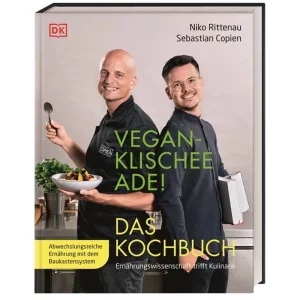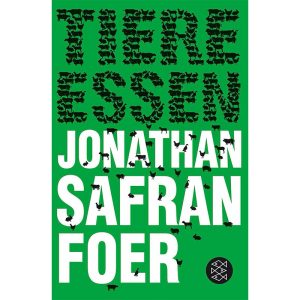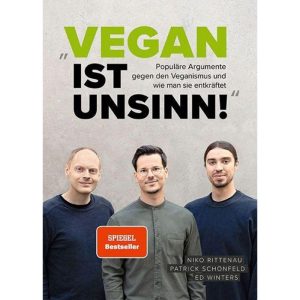Is one's own diet a private matter? Meat, eggs, cheese, vegetables, fruit - we live in a free country and can basically eat what we want. So far so good. In the meantime, for a wide variety of reasons, our food culture includes many different Diets emerged. Accordingly, the topic of food is increasingly on the table in everyday conversations - and not everyone likes it.
Sentences like "What I eat is my business and my private pleasure" or "To each his own" - we have certainly all heard them in countless discussions or even said them ourselves. But is one's own diet really no one else's business?
In this article, I would like to explain to you why choosing your own food is a private decision, but not a purely private matter. Let's go!
In advance, here is a brief overview:
Why Isn’t Our Food a Private Matter?
Privacy is the familiar space in our lives, where we can live out our personality and individuality without constraint and develop freely. If something is private, then by definition it only affects the individual.
Unsere persönliche Ernährung wäre also so lange Privatsache, wie sie nur uns selbst betrifft. Doch die Lebensmittel, die wir essen, ob Pflanzen oder tierische Erzeugnisse, wachsen nicht auf unseren Tellern oder an der Gabel, sondern haben eine Geschichte.
Man isst nicht allein. The decision of what to eat has consequences for the lives of other people (e.g., medical costs, social costs, environmental costs (see Externalization of Environmental Costs)), for the environment (e.g. Rainforest deforestation, Climate Change) - and last but not least for the lives of cows, pigs, chickens and countless other animals that feel joy and pain just as we humans do.
„Essen ist keine Privatsache. […] Essen beinhaltet ganz konkrete positive und negative Folgen – nicht nur für den eigenen Körper, sondern auch für die Umwelt, nachfolgende Generationen und andere Menschen.“
Journal for Gastrosophy
Letztendlich hat die Entscheidung sogar Folgen für das eigene Leben. Aber da man harms not only himself, but above all third parties (whether directly or indirectly), one cannot speak of a private matter here.
Tip: Eating meat, for example, is not a personal choice, since the decision accepts a victim who loses his life. You can learn more about the argument in the linked post.
What We Eat Affects More Than Just Ourselves
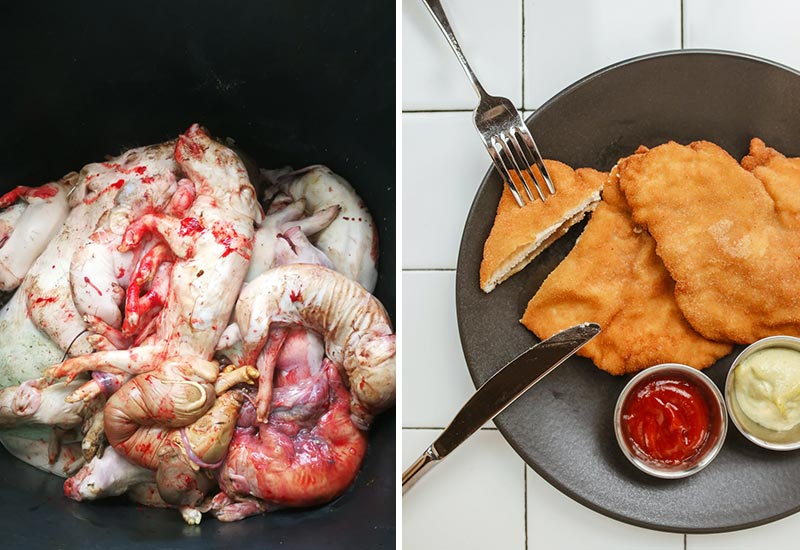
Everything we eat consumes natural resources and affects third parties in any way. Products such as soy, oats, wheat or corn also have to be cultivated at great expense - and with the Harvesting with large machinery can kill animals. Schon der Konsum pflanzlicher Lebensmittel ist also streng genommen keine reine Privatsache.
However, meat, eggs, cheese and milk are definitely not a private matter, da der Tod von mindestens einem Tier in Kauf genommen wird. Hinzu kommen gesundheitliche Risiken und gravierende Folgen für den Planeten und uns Menschen selbst.
Notice: I have deliberately chosen the above picture because it represents reality and underpins the fact that the consumption of a "pork cutlet" is not a private matter. By the way, not only one animal dies - countless piglets are also crushed at birth in the cramped stalls, which subsequently end up in the garbage can. If you find the picture too crass, you should eat a purely vegetable diet.
How Animal-Based Foods Impact Others

Nowadays, there is no longer any medical necessity for eating animals - yet many people do it. The decision to eat a steak, scrambled eggs or a glass of milk of animal origin, has not only effects on the exploited animal.
Hier sind einige Folgen der (Massen-)Tierhaltung zur Erzeugung von Lebensmitteln (Quelle: „Vegan ist Unsinn!“ von Niko Rittenau*) übersichtlich zusammengestellt.
The Factory Farming is responsible for the causation/consumption of...
- 12-18 percent of all global Greenhouse gas emissions (Climate Change)
- 70-80 percent of the Deforestation of the Amazon rainforest (Rainforest deforestation)
- 30-33 percent of the world's Land area and 70-80 percent of the agricultural land (Land consumption)
- 36-46 percent of the world's Harvest (food consumption)
- About 30 percent of the human-caused Decline of animal and plant species (Species Extinction)
- About 33 percent of the overfished fish populations (Overfishing of the seas)
- 70-80 percent of all the Antibiotics (Antibiotic Resistance)
- 60-75 percent of all human pathogenic Pathogen (zoonotic risk)
Angesichts der genannten Folgen für die Tiere, die Umwelt und für andere Menschen, ist Ernährung keine reine Privatsache mehr. Die Entscheidung fällt zwar privat – die Kosten tragen jedoch vor allem andere. Schon allein deshalb, weil die eigene Ernährung das Leben Dritter beeinträchtigt, ist sie also keine Privatangelegenheit mehr.
Let's not misunderstand each other: The consumption of plant-based foods also consumes resources. But because the "detour animal" is avoided, are plant foods much more efficient.
"My Private Business!" – Common Arguments Debunked
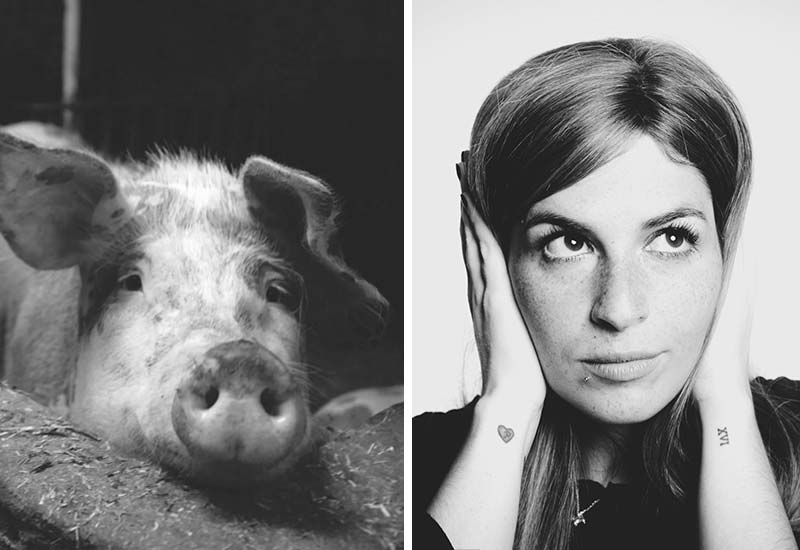
Hier möchte ich noch einmal kurz mit einigen Argumenten aufräumen, die das Thema der Privatsphäre der eigenen Ernährungsweise betreffen.
Streng genommen handelt es sich bei den folgenden Sätzen nicht einmal um ein Argument, sondern vielmehr um eine psychological barrierthat allows you to stop discussing things and just leave everything as it is. "This is a private matter!" - End of the discussion.
"Everyone Should Mind Their Own Business."
Dieser Spruch bedeutet, dass jemand besser seine eigenen Dinge in Ordnung bringen sollte, als sich in fremde Angelegenheiten einzumischen und andere Menschen zu kritisieren. Ich halte das grundsätzlich für eine gute Einstellung.
In einem Gespräch über Ernährungsgewohnheiten ist der Satz jedoch fehl am Platze, as it bypasses a substantive discussion of the criticism and nips any discussion in the bud.
"What I Eat Is Nobody Else’s Concern."
Wie bereits oben im Beitrag erläutert, hat die eigene Ernährungsweise (gravierende) Folgen für Mensch, Tier und Umwelt. Der Spruch Creates a great distance from the criticism und soll die aufkommende Diskussion verhindern.
Bei anderen Ungerechtigkeiten – zum Beispiel bei Kindesmissbrauch – würden wir es niemals dulden, wenn jemand diesen damit rechtfertigt, dass es seine Privatsache sei, wie er mit seinem Kind umgeht.
Warum sollten wir es also bei cruelty to animals oder klimaschädlichem Verhalten dulden? Solange das eigene Essen Opfer fordert, geht es sehr wohl auch andere etwas an.
"Live and Let Live."
Mit diesem Scheinargument möchten Menschen „fehlende Toleranz“ einfordern und darauf hinweisen, dass jeder so leben kann, wie er will. Zwischen den Zeilen und bezogen auf die eigene Ernährung, bedeutet auch dieser Satz, dass es die eigene Privatsache sei, was man isst.
Letztlich bedeutet dieser Satz eher „Leben und töten lassen“ – das genaue Gegenteil dessen, was er suggeriert. Um das Töten von Tieren für die eigenen Essgewohnheiten zu rechtfertigen, reicht der Spruch also schon bei etwas genauerer Betrachtung nicht aus.
But it is not only the animals that are not "let live". People also suffer and die among inefficient, animal-based foods. We could, for example, reduce the End world hunger immediately and the Feed all of humanity a purely plant-based diet.1 Ganz einfach, weil der „Umweg Tier“ vermieden wird, wenn wir die (Futter-)Pflanzen direkt konsumieren, anstatt sie an Tiere zu verfüttern und dann ihre Körperteile zu essen.
„Leben und leben lassen“ ist also ehrlich gesagt ein ziemlich absurd argument, to justify having animals killed for your own food and endangering other people.
Tip: At vegan for people erläutere ich dir, warum der Veganism nicht nur Tiere, sondern auch Menschen schützt. Schau unbedingt mal rein!
"To Each Their Own."
This means that every person should have the right to their own views, opinions, preferences and actions. Who does not share an opinion, should be tolerant and simply not be bothered by it. Doch mit diesem Spruch kann man nicht einfach soziale Ungerechtigkeiten und jegliche Kritik abweisen.
The original meaning of the saying of the Greek philosopher Plato was that each person is responsible for a just society should act in a way that corresponds to his nature and circumstances. "To each his own" thus had a solidary basic ideas.
But the actual meaning has been lost over time. Not least because the saying also instrumentalized by the National Socialists and an den Eingängen von Konzentrationslagern angebracht wurde. Aus einer jahrtausendealten Gerechtigkeitsformel wurde dadurch eine Todesformel – „jedem, was er verdient“, sozusagen. Vor dem Hintergrund ist der Satz besonders makaber.
Bezogen auf den Konsum tierischer Lebensmittel, wie Fleisch, Eier oder Käse, wird deutlich, dass „Jedem das Seine“ eigentlich das Gegenteil der ursprünglichen Bedeutung aussagt. You take away from innocent cows, pigs, chickens and many other species your - their freedom, their offspring and their lives.
Tip: Weiter Irrtümer oder Prejudices against the vegan diet und wie man sie logisch entkräftet, zeige ich dir im verlinkten Blogbeitrag.
Nutrition Is Not a Private Matter – Eating Consciously Means Respecting Others
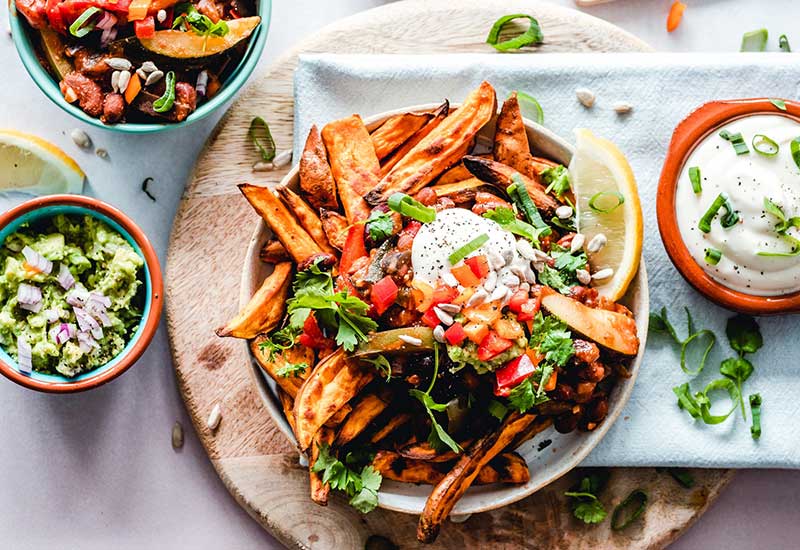
We oil, fry and bread pork body parts and call it schnitzel - one of many euphemistic Euphemisms for animal products, which Memory of the animal in hiding hold
"What you eat is for everyone to decide for themselves." - the sentence magically transforms into a very egoistic saying as soon as one Viewing one's own actions from the perspective of the victims.
Tiere, aber auch Menschen, leiden und sterben unter der Ernährungsentscheidung, die man gerne locker und leicht als Privatangelegenheit abstempeln würde. Die Entscheidung fällt zwar privat – doch sie ist selbstverständlich keine Privatsache.
"I am life that wants to live, in the midst of life that wants to live."
Albert Schweitzer (more at Animal welfare quotes)
To many, a purely plant-based diet seems too difficult. But as soon as you change your perspective, you see who really has a hard time. To better understand the perspective of the victims, I personally enjoyed the Dominion film helped. It shows what we humans do to animals for our private pleasure. It is simply a brutal injustice towards all non-human animals - and disrespectful, ignorant and obstinate to dismiss it as a non-public matter.
Wir sind es gewohnt, Fleisch zu essen – aber we are also able to question and change our behavior. Siehst du das ähnlich? Dann möchte ich dir abschließend noch das Cookbook "Vegan & Easy" by Bianca Zapatka* ans Herz legen. Es macht dir den Umstieg wesentlich leichter. 🙂
Ich hoffe, dass ich dir mit diesem Beitrag weiterhelfen konnte. Hast du Fragen, Tipps oder Anregungen? Dann freue ich mich auf deinen Kommentar!
Stay animal-friendly,

PS: Findest du auch, dass Veganer:innen nerven? Im verlinkten Artikel erläutere ich dir, was genau am Veganismus eigentlich so „ätzend“ ist. 😉
References:
- M. Berners-Lee, C. Kennelly, R. Watson; u.a. (2018): Current global food production is sufficient to meet human nutritional needs in 2050 provided there is radical societal adaptation, abrufbar unter https://www.researchgate.net/publication/326488835_Current_global_food_production_is_sufficient_to_meet_human_nutritional_needs_in_2050_provided_there_is_radical_societal_adaptation. [12.03.2025]. ↩︎


